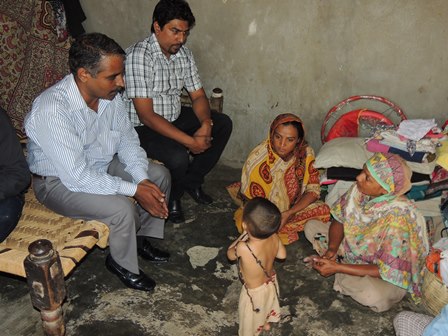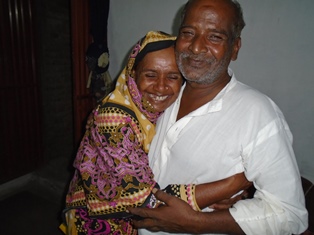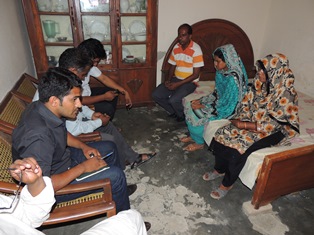
Christians have continued to be accused of blasphemy against Islam, in three separate recent cases in Pakistan. In one, a group of 35 was briefly accused of insulting the Prophet Muhammed before the charge was quickly changed from one of blasphemy. From evidence, all the cases appear to be either lodged to seek personal revenge, or solely to target Christians because of their faith.
All three cases have emerged in the Punjab, the largest province of Pakistan, which is home to dozens of extremist Islamist organizations. This is where most of the blasphemy cases against Christians have been lodged since the early 1980s, when these controversial laws were introduced by President Zia ul-Haq.
The courts have granted bail to the suspects in all three, which is rare in blasphemy cases, giving rise to the belief that the charges are not well-founded.
In the first case, a Muslim man lodged a criminal case against a Christian for sharing the Old Testament version of the story of Lot, from the book of Genesis.
The incident took place on August 23 in Bahawalpur, about 450 kilometres from Lahore. Sixty-year-old Naja Masih, a resident of Bahawalpur and a retired sweeper, was sitting outside his home with his neighbor Shahid Mehmood, who runs a barber shop in Masih’s street.
They were discussing similarities between the Bible and the Qur’an, after which Masih was charged and immediately handed to the police. In his First Information Report (FIR), submitted in the Civil Lines Police Station, neighbour Mehmood stated that Masih told him “God himself took human form (God forbid) and appeared to Lot, and told him to leave his village.” Mehmood further alleged that Masih had injured his religious feelings, by saying that when Lot had fled Sodom along with his daughters, his daughters “intoxicated” him and slept with him to continue their father’s lineage.

Masih’s wife, Nargis Bibi, told World Watch Monitor that Mehmood’s wife came to her after the incident, and told her that the Christians of the colony should be thankful to them that their houses had not been set on fire for committing blasphemy. Nargis said the situation was tense in their area after the incident, so they fled. “For more than a week the police did not tell us Masih’s whereabouts,” she added. She said when they saw Masih in police custody a week later, he told them that he was still unable to make sense of why he was arrested; he’d only explained what was written in the Bible.
Civil Lines Sub-Inspector Muhammad Ishaq, the investigating officer, told World Watch Monitor that as soon as the discussion between Masih and Mehmood turned into a conflict the local police were informed. They immediately reached the spot and arrested Masih. “Because there was a fear of attack, Masih was kept in another police station for his security,” Ishaq said.
When he was told that what Masih shared with Mehmood was exactly according to the Bible, Sub-Inspector Ishaq said that no one had explained this to him before. “If it’s proved that Masih’s statement is part of his faith, then he will be given relief in investigation,” he assured, but said that now the case would be settled in the court.
The Voice Society, an organization working for Christians, represented Masih in court and secured his release on bail, ahead of his trial, on Saturday 27th September.
The questions raised by Masih’s case are not new. Pakistan’s Assembly of Islamic Clergy, or Jamiat Ulema-e-Islam, consists of three political blocs, each named after its representative politicians. In 2011, one, Jamiat Ulema-e-Islam-Sami-ul-Haq (JUI-S), demanded that the Supreme Court ban certain passages of the Bible because, it said, they have blasphemous content. JUI-S’s leader Senator Maulana Sami-ul-Haq runs Darul Uloom Haqqania, commonly known as the University of Jihad. The alumni of the university include many senior Taliban leaders, including Mullah Omar.
Because Islam believes that prophets are innocent, sinless and perfect, the JUI-S claimed that “several stories have been inserted into (the Bible) charging various prophets with a variety of moral crimes, which undermine the sanctity of the holy figures…such insertions strongly offend the Muslims.” Although the JUI-S later withdrew its claim, this is one of the accusations that Christians can still face every day in Pakistan.
A Hindu convert to Christianity accused of blasphemy

Another blasphemy case was registered against a convert from Hinduism, also in Bahawalpur, on Aug 29. Javed Masih had converted to Christianity about three years ago and was working as a sweeper in the Government High School of Excellence. Masih was not present in the school when an alleged burning of the Qur’an took place there, but the police still arrested him along with his co-worker, Anand Lal, a Hindu sweeper.
According to the First Investigation Report (FIR), submitted in the Baghdad-ul-Jadeed Police Station by school Principal Muhammad Iqbal, when he (the Principal) reached the school at about 7:20 a.m., he was told by the school attendant Muhammad Qasim that a few Islamic charts and a copy of the Qur’an were burning in a classroom. The Principal alleged that Qasim’s son (who studied in that classroom) told his father that when he entered, he saw the Qur’an burning and so informed his father. In the FIR Principal Iqbal further alleged that:
Masih’s wife, Malika Bibi, told World Watch Monitor that they were living in the school compound and Masih used to go to the school to clean at around 5 a.m, then come back for breakfast at around 7 a.m. She said that at the time of the incident, Masih had come home, but was arrested when he went back to school at around 8:30 a.m. She said the police and Muslim clerics had gathered by the time he reached the school. “After his arrest we also fled from there in fear of our lives,” she said. “Since then, I am living with my three little children at my brother’s place,” she added.
.jpg)
Investigation Officer Sub-Inspector Muhammad Iqbal told World Watch Monitor that Javed Masih and Anand Lal were implicated by the complainant, in a supplementary statement to the FIR. He said that, after investigation, the police suspected Lal of committing the crime because he bore malice against Masih, after the latter had been deployed in the block where he (Lal) had been working. Earlier, Lal had torn up a few attendance registers in the block where Masih was working, so that the school administration would remove him, the policeman said. “When (Lal) saw that nothing had happened, he burned Islamic charts and a copy of the Qur’an in Masih’s block, believing that now Masih would be removed from his job for sure.”
In spite of the police’s confidence in Masih’s innocence, he was charged, sent to prison and now faces trial, while Lal has been declared innocent. Talking to World Watch Monitor, the Coordinator of The Voice Society, Aneeqa Maria, said a bail application had been accepted and Masih was released on September 28.
She said in blasphemy cases judges are often reluctant to grant bail, due to public pressure, but in both cases above, judges have showed boldness and decided the cases on merit.
“The chances of Naja’s and Javed’s acquittal are very high, but still they cannot go back to their localities and continue their normal lives for fear of their life.”
Seeking land for Christian graveyard implicates dozens in a blasphemy case
In the third case of blasphemy charges, the Christians of a village (chak 206) in Faisalabad had no place to bury their dead. There are about 400 households of Christians there, while about 500 are of Muslims. As most of the Christians are poor, they could not buy some land to bury their dead. Their old graveyard had been filled up with graves, so they requested a local politician –Chaudhry Muhammad Iqbal – to provide them some more space. Iqbal’s son told the Christians that they could level an area outside the village for a Christian graveyard.
One of those accused of blasphemy, Rafique Masih, told World Watch Monitor that on September 2 there were about 30 to 40 Christians who went to a nearby deserted place, identified by Chaudhry Muhammad Iqbal for the graveyard. “Although Muhammad Iqbal was not there, his son Muhammad Wasif Iqbal took us along to point out the location for the graveyard,” Masih said. He said all the Christians worked to level the area. “At about 4 p.m., a few Muslims came and told us that there were graves of Muslims where Christians wanted to make their own graveyard. We apologized and stopped work, after which they left and we also came back,” he said.
Masih said the matter was settled, but that in the evening several police officers came and the matter was again taken up in front of a gathering. He said that, in the presence of the police, the matter was once again settled after the Christians apologized, and it was confirmed that there was no intention to hurt any feelings. “At about 3 a.m. when we were sleeping, the police were arresting Christians from their houses in a case they did not know anything about,” he added. “Several of us are on pre-arrest bail while a few have been sent to prison after arrest.”
In the FIR submitted in the Muridwala Police Station, the complainant Ashiq Hessian has identified 35 people, whom he alleges were armed with sticks, axes and firearm weapons. He states that:
Muridwala Station House Officer Usman Lashari told World Watch Monitor that the land belonged to the provincial government, and had been allotted for a Muslim graveyard. He said about 40 to 50 Christians had gone to level the area, but it was clear that they had no intention of grabbing the land and injuring the feelings of local Muslims. “Investigation shows the Christians did not know that the land had been allocated for a Muslim graveyard, and has been used for this purpose in the past,” he confirmed.
Lashari also said that the accused were initially charged under Section 295-C of the Pakistan Penal Code (PPC) which has a death penalty for insulting the Prophet. “That charge was immediately struck out, and now they are charged under Section 297 (PPC) which punishes for trespassing in a burial place; a punishment of one year.”
He also said that eight people who’d been imprisoned after initial arrest are now released on bail, while 24 others, initially on pre-arrest bail, have now been found innocent. “I believe there is previous animosity also at play between Christians and Muslims; otherwise, this matter should have been settled by now.”
Pakistan People’s Party minority wing leader Napoleon Qayyum said that this spate of blasphemy accusations against Christians had come at a time when the country is passing through political upheaval. He noted that, as political parties have been protesting in the capital, tens of thousands of police have been pulled in from all other cities and deployed in Islamabad.
“As the law and order situation deteriorates, people in general find it easy to implicate Christians in such cases, to settle personal scores and to suppress them.”
Qayyum went on to explain that Pakistani Christians, being very poor, are often accused of committing blasphemy by locals in order to settle a score, or as ‘scapegoats’ for perceived anti-Muslim Western policies, as well as for their religious beliefs. “In most cases, despite lack of any direct or indirect evidence, Christians are suspected of maligning Islam” he concluded.